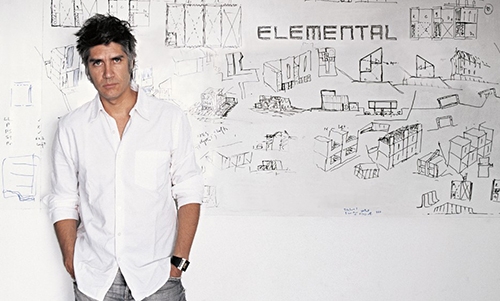Alejandro Aravena wins Pritzker Prize 2016; owes success to asking 'stupid questions'
Alejandro Aravena, the socially-conscious Chilean architect famed for building "half a good house," has won the 2016 Pritzker Prize for architecture, the profession's highest honor.
Tom Pritzker, the chairman of the Hyatt Foundation which awards the prize, called Aravena "an architect who deepens our understanding of what is truly great design."
48-year-old Aravena, who is among the esteemed prize's youngest winners -- is best known for creating inventive, low-cost social housing. His Santiago-based practice ELEMENTAL has built over 2,500 units of housing since 2000, focusing on under-served urban migrants -- including a 2003 project in Iquique, Chile where the firm built housing units which appeared half-built, with the intention that residents extended their living space into the leftover void.
His practice is known for its participatory design approach, where the architects work with the public and the buildings' end users from the outset: not to "co-design" the building, he says, but to define lines of investigation that free more complex projects from unnecessary complications. He says the approach means asking "stupid questions."
"If you are a rigorous outsider and pay careful attention to the information then eventually you formulate those stupid questions that allow you to move forward."
"Half of a good house" financed with public money. The yellow block, filled-in, shows how middle-class standard can be achieved by the residents themselves.
While he has little profile among the public at large in the U.S. or Europe, Aravena is recognised by peers as one of the world's leading architects, and over the past decade he has won prestigious architecture awards including the Marcus Prize and the Erich Schelling Medal. He sat on the jury for the Pritzker prize for six years before this year's win.
In a statement that compounded the prize's focus, in recent years, on design that marries artistry with social impact, Pritzker said: "His built work gives economic opportunity to the less privileged, mitigates the effects of natural disasters, reduces energy consumption, and provides welcoming public space."
For Aravena, speaking over the phone from his practice in Santiago, Chile, the prize is a reward for his practice's five-partner team, for a consistent approach that has married exploring new fields with a refusal to be intimidated by unfamiliar:
"Everything that we've done is an unexplored territory [for us]. Back in 2000, when we started social housing I had no idea what a 'subsidy' was, so in a way we've been very consistent and rigorous in using our own ignorance as a powerful tool."
(CNN)
Related Posts

